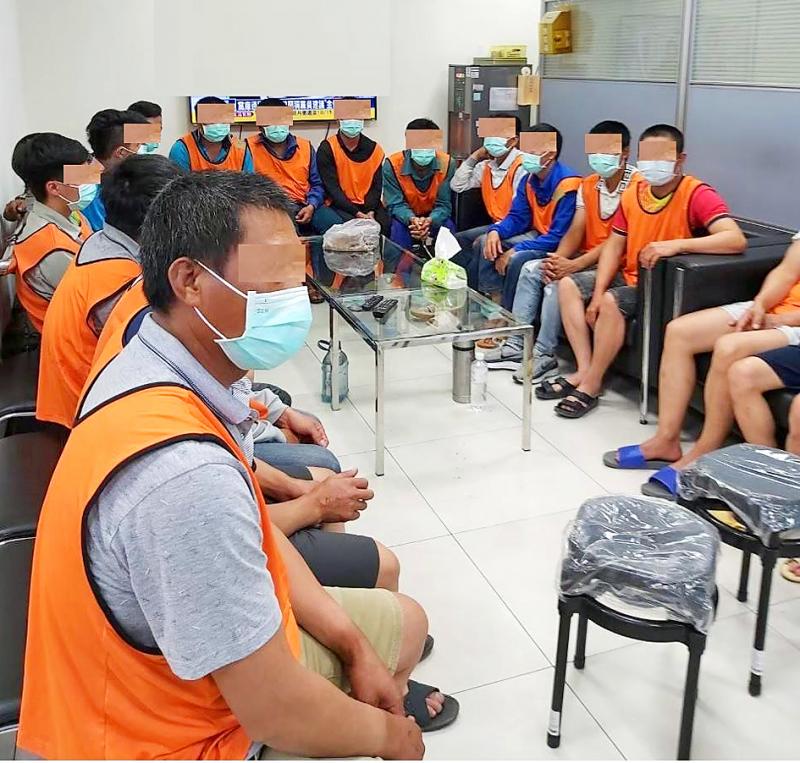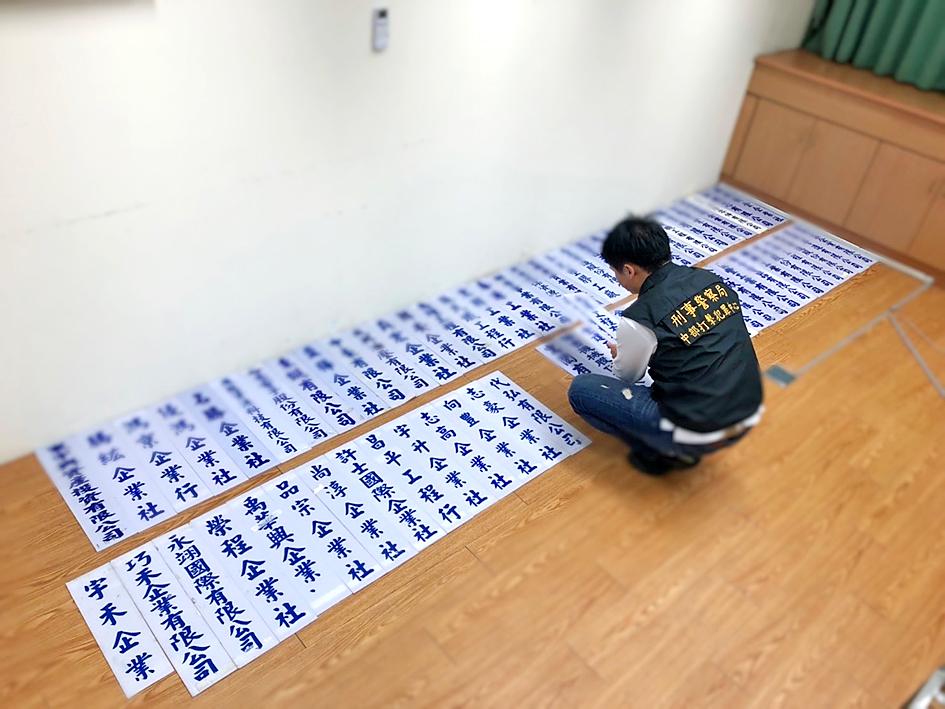Authorities have indicted four people for allegedly docking Vietnamese workers half of their monthly wage, including a Vietnamese woman naturalized in Taiwan, Diao Yu-hong (刁予弘), who headed up labor placement companies.
The Taichung District Prosecutors’ Office described the case as the biggest of its kind in the nation’s history, with the suspects allegedly making illegal gains of about NT$25.75 million (US$905,988).
The office yesterday completed a five-month investigation and indicted Diao, 41, owner of Hong Yu Employment Service Agency Co (弘宇人力仲介公司), and her staff, including Vietnamese interpreter Ngo Quoc Ha (吳國河), deputy general manager Hsu Shih-chang (許士樟) and accountant Lin Chia-chin (林佳瑾).

Photo: Chang Jui-chen, Taipei Times
After setting up the company in 2017, Diao allegedly circumvented legal channels by using forged documents, falsified labor service records and set up 19 shell companies to bring 126 Vietnamese to Taiwan to work in the construction industry, Taichung prosecutor Chang Chieh-kai (張凱傑) said.
Although the 126 Vietnamese had signed work contracts, Diao “sold” the workers to Chuan Shun Construction Co (川順營造) and 37 other firms, Chang said.
“Diao charged the 38 companies NT$36,000 to NT$42,000 for each worker’s monthly salary, as well as overtime, registration costs for the shell companies and other fees,” he said.

Photo: Chang Jui-chen, Taipei Times
However, the workers received only NT$16,000 to NT$19,000 per month, with Diao claiming that she had to deduct labor insurance and other costs, he said.
The Vietnamese workers told prosecutors that they believed they were working legally in Taiwan and did not know Diao’s actions were illegal, Chang said.
They told prosecutors that when Diao was recruiting in Vietnam, her advertisements claimed that workers would earn a minimum monthly wage of NT$23,800 as per labor laws, he said.
When they complained about receiving only half of the promised wage, Diao threatened to have them deported, as her company had confiscated their passports and personal papers, Chang said.
The workers did not dare complain and worked much harder, doing overtime, including on weekends and holidays, to supplement their income, he said.
Prosecutors said that Diao’s actions were a “ruthless exploitation of fellow Vietnamese, deriving illegal profits on the back of their physical labor.”
“If they are injured on the job, they have no insurance coverage and no protection,” Chang said.
Prosecutors have requested a severe punishment for Diao over her egregious offenses and human exploitation, he said.
The suspects face indictment on forgery charges, as well as breaches of the Human Trafficking Prevention Act (人口販運防制法) and the Employment Service Act (就業服務法).
Records show that Diao was born in Ho Chi Minh City, married a Taiwanese and moved to Taichung, where they have lived for the past two decades.
She ran in the nine-in-one elections in 2018 as an independent for a Taichung city councilor seat, with media at the time describing her as the “first naturalized immigrant” to contest the seat.
During her election campaign, she promised “to provide better services to new immigrants, spouses and the underprivileged.”
She lost.

DAREDEVIL: Honnold said it had always been a dream of his to climb Taipei 101, while a Netflix producer said the skyscraper was ‘a real icon of this country’ US climber Alex Honnold yesterday took on Taiwan’s tallest building, becoming the first person to scale Taipei 101 without a rope, harness or safety net. Hundreds of spectators gathered at the base of the 101-story skyscraper to watch Honnold, 40, embark on his daredevil feat, which was also broadcast live on Netflix. Dressed in a red T-shirt and yellow custom-made climbing shoes, Honnold swiftly moved up the southeast face of the glass and steel building. At one point, he stepped onto a platform midway up to wave down at fans and onlookers who were taking photos. People watching from inside

A Vietnamese migrant worker yesterday won NT$12 million (US$379,627) on a Lunar New Year scratch card in Kaohsiung as part of Taiwan Lottery Co’s (台灣彩券) “NT$12 Million Grand Fortune” (1200萬大吉利) game. The man was the first top-prize winner of the new game launched on Jan. 6 to mark the Lunar New Year. Three Vietnamese migrant workers visited a Taiwan Lottery shop on Xinyue Street in Kaohsiung’s Gangshan District (崗山), a store representative said. The player bought multiple tickets and, after winning nothing, held the final lottery ticket in one hand and rubbed the store’s statue of the Maitreya Buddha’s belly with the other,

Japan’s strategic alliance with the US would collapse if Tokyo were to turn away from a conflict in Taiwan, Japanese Prime Minister Sanae Takaichi said yesterday, but distanced herself from previous comments that suggested a possible military response in such an event. Takaichi expressed her latest views on a nationally broadcast TV program late on Monday, where an opposition party leader criticized her for igniting tensions with China with the earlier remarks. Ties between Japan and China have sunk to the worst level in years after Takaichi said in November that a hypothetical Chinese attack on Taiwan could bring about a Japanese

‘COMMITTED TO DETERRENCE’: Washington would stand by its allies, but it can only help as much as countries help themselves, Raymond Greene said The US is committed to deterrence in the first island chain, but it should not bear the burden alone, as “freedom is not free,” American Institute in Taiwan Director Raymond Greene said in a speech at the Institute for National Defense and Security Research’s “Strengthening Resilience: Defense as the Engine of Development” seminar in Taipei yesterday. In the speech, titled “Investing Together and a Secure and Prosperous Future,” Greene highlighted the contributions of US President Donald Trump’s administration to Taiwan’s defense efforts, including the establishment of supply chains for drones and autonomous systems, offers of security assistance and the expansion of